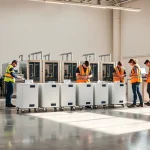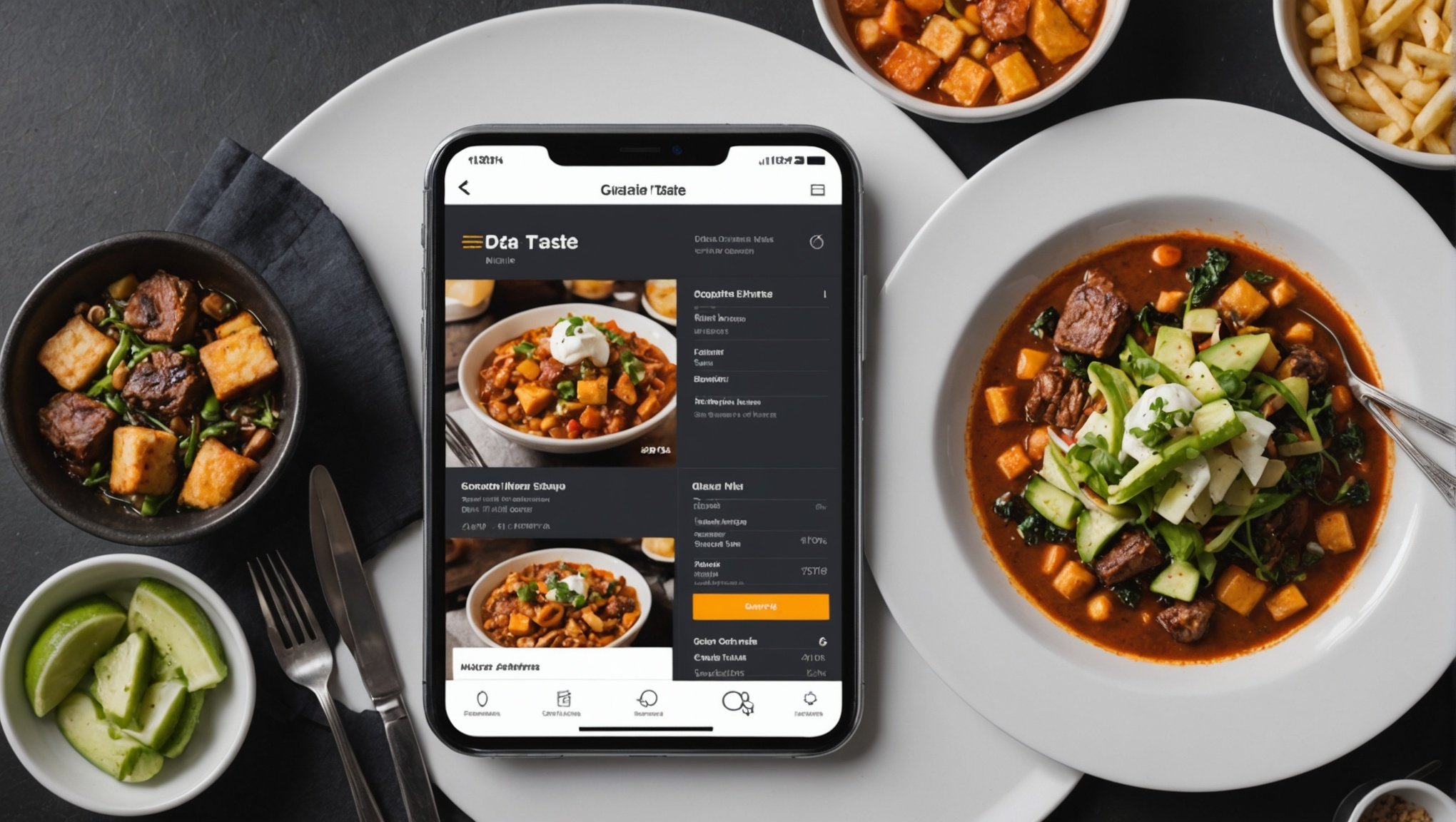Data analytics is revolutionizing the dining experience in Glasgow. By harnessing insights from customer preferences, restaurants can create personalized menus that cater to individual tastes. This approach enhances customer satisfaction and loyalty, ensuring diners enjoy unforgettable meals tailored just for them. Explore how local eateries are leveraging data to transform their offerings and stay ahead in a competitive market. Discover the impact of technology on culinary creativity and the future of dining in Glasgow.
The Role of Data Analytics in the Food Industry
Data analytics in restaurants has become a game-changer, offering valuable insights that drive the industry forward. By leveraging data, restaurants can not only optimize their operations but also tailor experiences to meet customer expectations more effectively. This shift is transforming traditional dining into a more personalized and engaging experience.
Also to discover : Unlocking Efficiency: Leveraging Data Analytics for Enhanced Operations in a Leeds Food Delivery Service
Incorporating data analytics enables restaurants to make informed decisions that enhance customer satisfaction. For instance, analyzing customer preferences and feedback allows for menu adjustments that resonate with guests, ultimately leading to increased loyalty. Furthermore, data analytics can streamline operations by predicting demand, thereby reducing waste and improving resource allocation.
One of the most significant benefits of data analytics in the food industry is the ability to personalize dining experiences. By understanding customer behaviour and preferences, restaurants can offer customized recommendations, enhancing the overall dining experience. This trend towards personalization is not just a passing fad but a growing expectation among consumers.
In the same genre : Unlocking Efficiency: Leveraging Data Analytics for Enhanced Operations in a Leeds Food Delivery Service
The integration of data analytics in restaurants is not just about numbers but about creating meaningful connections with customers. As the food industry continues to evolve, embracing data-driven strategies will be crucial for staying competitive and meeting the ever-changing demands of diners.
Case Studies of Glasgow Restaurants Utilizing Data Analytics
In the bustling city of Glasgow, several restaurants have embraced data-driven dining to enhance their services. These Glasgow restaurant case studies showcase how data analytics can revolutionize the dining experience. By examining these successful implementations, we gain insights into the tangible benefits of leveraging data.
One notable example is a popular Glasgow eatery that utilized data analytics to create personalized menus. By analyzing customer preferences and dining habits, the restaurant crafted menus that catered specifically to their clientele's tastes. This approach not only increased customer satisfaction but also boosted repeat visits, demonstrating the power of personalized dining experiences.
Another restaurant in Glasgow took a different approach by using data analytics to optimize their supply chain. By predicting demand more accurately, they reduced food waste significantly and improved cost efficiency. This strategic use of data not only enhanced their operational performance but also aligned with sustainable practices, appealing to environmentally conscious diners.
These successful implementations highlight valuable lessons for other establishments. By focusing on customer preferences and operational efficiency, restaurants can create a competitive edge. The Glasgow restaurant case studies illustrate that embracing data analytics is not merely a trend but a necessary evolution in the food industry.
Benefits of Personalized Menus in Restaurants
Personalized menus offer substantial advantages in the restaurant industry, significantly enhancing customer satisfaction and loyalty. By tailoring menu options to individual preferences, restaurants can create a more engaging dining experience, which is crucial for customer retention. When diners feel that their unique tastes are acknowledged, they are more likely to return, boosting customer loyalty.
The impact on sales and profitability is another compelling reason for adopting personalized menus. With targeted offerings, restaurants can increase the likelihood of upselling and cross-selling, as customers are more inclined to try items that align with their preferences. This strategy not only bolsters sales but also improves overall profitability by maximizing each customer's spend.
Moreover, personalized menus contribute to a more memorable dining experience. By understanding and catering to customer preferences, restaurants can offer dishes that resonate personally with diners. This approach goes beyond just food; it includes creating an atmosphere where customers feel valued and understood.
Incorporating loyalty programs alongside personalized menus can further enhance these benefits. By rewarding repeat visits and encouraging feedback, restaurants can refine their offerings continually, ensuring they meet evolving customer expectations. This dynamic approach to dining fosters a deeper connection between the establishment and its patrons.
Tools and Technologies for Data Analytics in Restaurants
In the competitive landscape of the restaurant industry, restaurant analytics tools are pivotal for gaining insights and enhancing customer experiences. These tools streamline data collection and analysis, allowing for more informed decision-making.
Technology for personalization is at the forefront, enabling restaurants to tailor their offerings. Popular tools like OpenTable and Resy provide valuable customer data, facilitating personalized dining experiences. They offer features such as reservation management and customer preference tracking, which are crucial for crafting personalized menus.
Data management software is another critical component, ensuring efficient handling of large data volumes. Software like Tableau and Power BI excel in visualizing complex data sets, making it easier for restaurants to interpret and act on insights. These platforms help in identifying trends and patterns that can inform menu adjustments and operational improvements.
When selecting the right tools, consider factors such as ease of integration, scalability, and user-friendliness. It's essential to choose tools that align with your restaurant's specific needs and goals. By leveraging the right combination of analytics tools and technologies, restaurants can not only enhance personalization but also improve overall efficiency and customer satisfaction.
Implementation Strategies for Data-Driven Menu Personalization
Developing a personalized menu requires a strategic approach to data integration and analytics. To begin, restaurants should establish clear goals for their personalized menu development. This involves identifying which customer preferences and behaviours will guide menu adjustments.
Implementation strategies start with gathering relevant data. Utilise reservation systems and feedback forms to collect insights into customer preferences. This data should then be integrated into a centralised system for easy access and analysis. Tools like Tableau can be instrumental in visualising this data, helping to identify patterns and trends.
When analyzing customer data, focus on segmentation. Group customers by preferences, dietary restrictions, and ordering habits. This segmentation allows for more targeted menu personalization, ensuring offerings align with specific customer needs.
Common challenges in implementation include data privacy concerns and the complexity of data management. Overcome these by ensuring compliance with data protection regulations and investing in robust data management software.
Best practices for personalized menu development include regular updates based on evolving data insights and customer feedback. Continuously refine your approach to maintain relevance and enhance customer satisfaction. By following these strategies, restaurants can successfully implement data-driven personalization, elevating the dining experience.
Expert Opinions on Data Analytics and Personalization
In the realm of restaurant analytics, industry professionals highlight the transformative power of data-driven strategies. According to expert insights, the integration of data analytics is not just a trend but a necessity for modern dining establishments. Industry professionals argue that understanding customer preferences through data is key to crafting personalized dining experiences that resonate with patrons.
An interview with a leading data analyst revealed that the future of personalized dining lies in the seamless use of technology to enhance customer interactions. They emphasised that the ability to predict customer needs and preferences will set successful restaurants apart. This perspective is shared by many in the field, who see personalization as a cornerstone of future dining experiences.
For restaurant owners eager to adopt these strategies, experts offer several tips. Firstly, they recommend starting with a clear understanding of your customer base. Utilising tools that gather and analyse customer data efficiently is crucial. Additionally, professionals advise keeping abreast of technological advancements to stay competitive. By leveraging expert insights and embracing data analytics, restaurant owners can position themselves at the forefront of the industry, offering unique and tailored experiences to their guests.
The Local Food Scene: Trends and Consumer Preferences in Glasgow
In Glasgow, food trends are shaping the dining landscape, with data-driven insights playing a pivotal role. Restaurants are increasingly focusing on menu personalization to cater to evolving consumer preferences. Current trends indicate a shift towards locally sourced ingredients, reflecting a growing demand for sustainability and authenticity in dining experiences.
Understanding consumer preferences is crucial for restaurants aiming to stay competitive. Data analytics provide valuable insights into local dining habits, revealing a preference for diverse and culturally rich menus. This is particularly evident in the rising popularity of fusion cuisine, which blends traditional Scottish dishes with international flavours.
Cultural influences significantly impact menu choices in Glasgow. The city's vibrant multicultural community has led to a diverse culinary scene, where diners seek unique and varied experiences. Restaurants are responding by offering menus that celebrate both local and global cuisines, appealing to a wide range of tastes.
These insights underline the importance of adapting to Glasgow food trends and consumer preferences. By leveraging data analytics, restaurants can tailor their offerings to meet the expectations of their clientele, ensuring a personalised and memorable dining experience. This approach not only satisfies diners but also fosters loyalty and repeat visits.
Measuring Success: Evaluating the Impact of Data-Driven Personalization
Evaluating the analytics impact of data-driven personalization in restaurants involves setting clear performance metrics. Key performance indicators (KPIs) are essential for assessing how effectively personalized menus are performing. Common KPIs include customer satisfaction scores, repeat visit rates, and average spend per customer. These metrics provide valuable insights into the success of personalized strategies.
To track these metrics, restaurants can use various tools designed for collecting and analysing customer feedback. Platforms like SurveyMonkey and Qualtrics are popular for gathering insights directly from diners. These tools help in measuring customer satisfaction and identifying areas for improvement. By consistently monitoring feedback, restaurants can refine their personalized offerings and enhance the dining experience.
Case studies offer practical examples of how establishments measure success. For instance, a restaurant may track the increase in repeat visits after implementing a personalized menu. Another might measure the rise in average spend per customer through targeted upselling strategies. These case studies highlight the tangible benefits of using performance metrics to guide decision-making.
By focusing on measuring success through defined KPIs and feedback tools, restaurants can ensure their data-driven personalization efforts yield positive results, ultimately driving customer loyalty and business growth.
Future of Data Analytics in Glasgow Restaurants
The future trends in Glasgow's restaurant industry are being shaped by emerging technologies that revolutionise data analytics. As these tools evolve, they offer unprecedented opportunities for personalisation and operational efficiency. For instance, artificial intelligence (AI) and machine learning (ML) are expected to play pivotal roles in analysing customer preferences with greater precision, allowing restaurants to tailor experiences even more effectively.
The data analytics evolution in dining will likely see a shift towards real-time data processing. This advancement enables restaurants to adapt quickly to changing customer behaviours and market conditions. By harnessing the power of predictive analytics, establishments can anticipate trends and adjust their offerings proactively, maintaining a competitive edge.
Looking ahead, the restaurant industry outlook suggests a continued emphasis on personalisation. As diners increasingly seek unique experiences, the ability to offer customised menus and services will become essential. Restaurants that leverage data insights for continuous improvement will not only meet but exceed customer expectations, fostering loyalty and repeat business.
In this dynamic landscape, embracing the future of data analytics is crucial for Glasgow restaurants aiming to stay ahead. By integrating these advanced technologies, they can enhance both the dining experience and operational performance.











